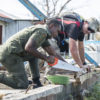By Ms T. Sanders
The contemporary world is entering a new era of Cold War between the United States and China, where New Zealand is in the crossroads between the two dominant powers. Having China as their largest trading partner and the United States as an intelligence/defence partner within the Five Eyes Agreement, New Zealand is facing a challenge in choosing their strategical partner. Another concern for New Zealand is the expressed interest in the South Pacific region by China and the United States, where New Zealand Defence Force has a special duty of care within the region due to its cultural and historical ties, and conducting operations “to protect and promote regional peace, security and resilience.”[1] This article will assess the directions which the New Zealand Army would need to take within the next twenty years, so New Zealand would remain to be a partner of choice.
The South Pacific area is becoming an arena for geostrategic interests for the United States and China. The United States is remaining dominant in terms of intelligence and defence, however, China is gaining influence over some of the South Pacific Islands. Such island nations as Papua New Guinea, Tonga, Fiji, and Vanuatu received military aid from China; additionally, Chinese companies have continued negotiations to build and administrate strategic bases such as ports and airfields[2]. China is also becoming a threat to New Zealand due to its political influences[3]. Moreover, this influence is effecting New Zealand’s membership to the Five Eyes Agreement, as New Zealand is considered to be the weakest link[4]. The likely scenario is that the United States and China will enter into a trade and military Cold War, therefore Pacific nations will have to choose a side.
The primary concern for New Zealand is choosing between a short-term strategy of continuation of economic trade with China or a long-term strategy in developing New Zealand’s national security aspects with the Five Eyes partners. In the situation that New Zealand decides to develop with its western allies, but China expands its influence in the South Pacific even further, what would be the outcome for New Zealand? Since the South Pacific becoming a hot/cold ‘battleground’ for the dominant powers[5], New Zealand would need to continue relationships with their Western partners. New Zealand already has a defence agreement with Singapore and ongoing military exercises. Japan and Taiwan are also some of New Zealand’s largest trading partners. Perhaps it would be wise for New Zealand to establish relationships with India, as India seems to be growing closer ties with the West[6]. However, choosing priorities in international relationships is not the only factor that needs to be considered by the New Zealand Army.
The New Zealand Army needs to think through where their strengths lie in becoming force multipliers for their allies. As a small nation, New Zealand needs to admit its weakness in conducting operations alone due to limited resources and manpower; therefore, there is a need to develop an approach of New Zealand becoming a valuable asset for their allies. Since the world is moving to rapid growth of technology, the New Zealand Army could concentrate on development of technology, for instance, electronic warfare that has become more prevalent. Also, cyber-warfare is considered a cheap tool of hybrid warfare and is heavily used by Russia and China. Another input by the New Zealand Army could be in development of anti-drone warfare, as well as close support unmanned aerial vehicles, as surveillance is one of the important aspects of warfare and of supporting the New Zealand Army’s other missions. For these reasons, the New Zealand Army should invest in development of cyber warfare, electronic warfare, and drone warfare, but must also keep a conventional warfare aspect through the Royal New Zealand Infantry Regiment and their support units.
Competitive nations are moving towards a hybrid style of warfare and the New Zealand Army should study this type of warfare to be able to develop sustained capabilities. A strategic move that the New Zealand Army could make is to develop a relationship with Ukraine, which for the past six and a half years has already been fighting hybrid warfare with Russia. Moreover, three of New Zealand’s key allies (the United States, the United Kingdom and Canada) continuously train and run joint military exercises with Ukraine[7]. The Ukrainian-Russian war is a multispectral, multidimensional conflict that includes high-tech/conventional warfare as well as siege warfare and urban combat[8]. The American troops believe that they have learned more from the Ukrainian Army, then they could teach them[9]. Any future conflict in the South Pacific could escalate into a hybrid war and the New Zealand Army must be ready to meet any potential challenge alongside New Zealand’s partner nations.
To summarise, the New Zealand Army must carefully assess the next stages of their strategic planning, so that they can contribute valuable forces within the circle of New Zealand Defence Agreements. There is a need to consider the capabilities of the New Zealand Army and focus on the areas which potentially could become force multipliers as part of the coalition action group. Since present and future warfare looks increasingly likely to be based on elements of hybrid warfare, it is essential for the New Zealand Army, as a learning organisation, to study all elements of hybrid warfare. The New Zealand Army could gain experience and knowledge by developing a working relationship with the Ukrainian military but must also understand that every conflict has a unique character.
Footnotes
1. “Strategic Defence Policy Statement 2018,” Ministry of Defence, https://www.defence.govt.nz/assets/Uploads/8958486b29/Strategic-Defence-Policy-Statement-2018.pdf (accessed: 28 October 2020). 29.
2. Anne-Marie Brady, “A Strategic Partnership: New Zealand-China Relations in the Xi Jinping Era and Beyond,” in Small States and the Changing Global Order (Springer, 2019). 141.
3. “China in Xi’s” New Era”: New Zealand and the Ccp’s” Magic Weapons”,” Journal of Democracy 29, no. 2 (2018). 69.
4. Zoe Zaczek, “Spy Claims New Zealand Could Be Kicked out of Five Eyes Intelligence Network Due to China’s Influence in the Country,” Daily Mail Australia, https://www.dailymail.co.uk/news/article-7884185/Spy-claims-New-Zealand-kicked-Five-Eyes-Chinese-influence.html (accessed: 28 October 2020).
5. Minghao Zhao, “Is a New Cold War Inevitable? Chinese Perspectives on Us–China Strategic Competition,” The Chinese Journal of International Politics 12, no. 3 (2019). 385.
6. Stephen F Burgess, “The Evolution of India-Us Relations and India´ S Grand Strategy,” Revista UNISCI, no. 49 (2019). 96-97.
7. Col Nick Ducich et al., “Transformative Staff Training in Ukraine,” Military Review (2016). 44.
8. Michael Kofman et al., Lessons from Russia’s Operations in Crimea and Eastern Ukraine (Rand Corporation, 2017). 73-77.
9. Corey Flintoff, “U.S. Army Begins Training Ukrainian Soldiers,” Parallels (2015), https://www.npr.org/sections/parallels/2015/06/25/417511636/u-s-army-begins-training-ukrainian-soldiers (accessed: 29 October 2020).
References
Brady, Anne-Marie. “China in Xi’s” New Era”: New Zealand and the Ccp’s” Magic Weapons”.” Journal of Democracy 29, no. 2 (2018): 68-75.
———. “A Strategic Partnership: New Zealand-China Relations in the Xi Jinping Era and Beyond.” In Small States and the Changing Global Order, 1-10: Springer, 2019.
Burgess, Stephen F. “The Evolution of India-Us Relations and India´ S Grand Strategy.” Revista UNISCI, no. 49 (2019).
Ducich, Col Nick, Lt Col Nathan Minami, Maj Ryan Riggin, and Capt Jacob Austin. “Transformative Staff Training in Ukraine.” Military Review (2016).
Flintoff, Corey. “U.S. Army Begins Training Ukrainian Soldiers.” Parallels (2015). https://www.npr.org/sections/parallels/2015/06/25/417511636/u-s-army-begins-training-ukrainian-soldiers (accessed: 29 October 2020).
Kofman, Michael, Katya Migacheva, Brian Nichiporuk, Andrew Radin, and Jenny Oberholtzer. Lessons from Russia’s Operations in Crimea and Eastern Ukraine. Rand Corporation, 2017.
“Strategic Defence Policy Statement 2018.” Ministry of Defence, https://www.defence.govt.nz/assets/Uploads/8958486b29/Strategic-Defence-Policy-Statement-2018.pdf (accessed: 28 October 2020).
Zaczek, Zoe. “Spy Claims New Zealand Could Be Kicked out of Five Eyes Intelligence Network Due to China’s Influence in the Country.” Daily Mail Australia, https://www.dailymail.co.uk/news/article-7884185/Spy-claims-New-Zealand-kicked-Five-Eyes-Chinese-influence.html (accessed: 28 October 2020).
Zhao, Minghao. “Is a New Cold War Inevitable? Chinese Perspectives on Us–China Strategic Competition.” The Chinese Journal of International Politics 12, no. 3 (2019): 371-94.






